Distinguished Service Award
CRA makes an award, usually annually, to a person or organization that has made an outstanding service contribution to the computing research community. This award recognizes service in the areas of government affairs, professional societies, publications or conferences, and leadership that has a major impact on computing research.
Manish Parashar
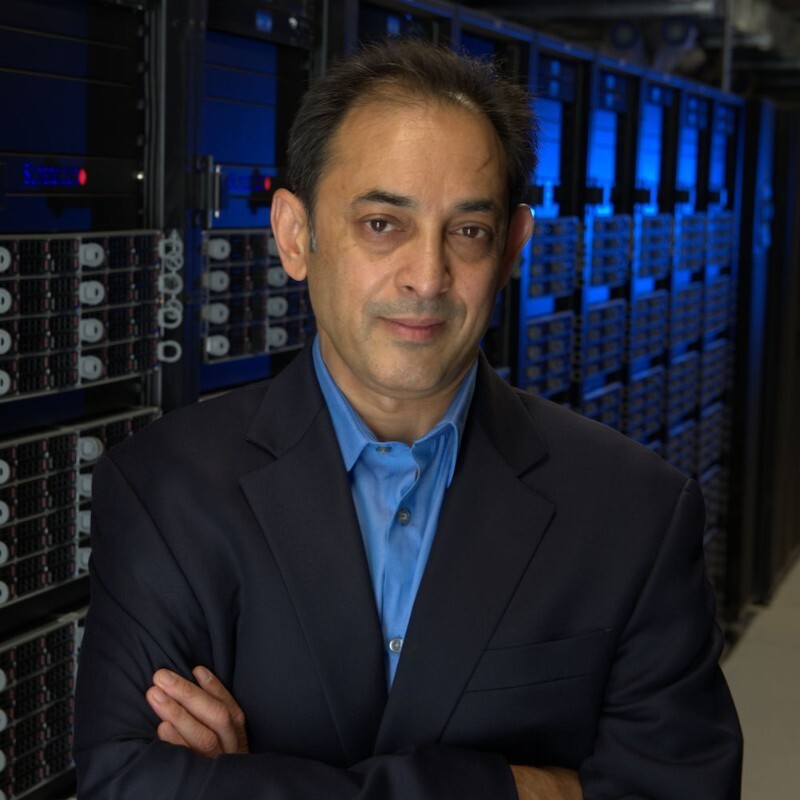
Director of the Scientific Computing and Imaging (SCI) Institute, Chair in Computational Science and Engineering, and Presidential Professor in the School of Computing at the University of Utah
Manish Parashar was selected to receive the 2024 CRA Distinguished Service Award in recognition of his multi-faceted and highly impactful service to the computing research community.
One of the world’s top scientific and technical leaders in computational and data-enabled science and engineering, Parashar’s accomplishments, particularly in the field of cyberinfrastructure, have brought about global benefits to computing research and to society as a whole.
The number and variety of Parashar’s contributions to the computing research community are a testament to his unique blend of technical knowledge, leadership, and ability to find consensus in service of getting big things done.
Parashar received his PhD in computer engineering from Syracuse University and was a postdoctoral researcher in computer sciences at the University of Texas at Austin before joining the faculty at Rutgers University, where he ultimately became a Distinguished Professor in 2015. He joined the faculty of the University of Utah as Presidential Professor of Computer Science in 2021, also becoming the Director of Scientific Computing & Imaging (SCI) Institute and Chair in Computational Science and Engineering.
As a researcher, Parashar has played a vital role in establishing autonomic computing as a discipline within computer science. His work has also made significant contributions to formalizing the concept of translational computer science–the application of theoretical knowledge and research findings from computer science to practical solutions.
Parashar has served the community in a variety of leadership roles through his involvement with the Association of Computing Machinery (ACM) and the IEEE Computer Society, serving in numerous leadership positions in technical committees and task forces, editorial boards, and conferences and workshops, and championing diversity and support for early career researchers. He is the Founding Chair of the Technical Consortium on High Performance Computing (TCHPC), Editor-in-Chief of the IEEE Transactions on Parallel and Distributed Systems (TPDS), and Chair of the IEEE Computer Society Committee on Open Science and Reproducibility.
As a public servant, Parashar led NSF’s Office of Advanced Cyberinfrastructure (OAC) from 2018 to 2023 as a rotator from the research community, during which time he led a number of significant initiatives. He spearheaded OAC’s set of strategic blueprints that translated a 2016 National Academies study on NSF’s role in the future of advanced cyberinfrastructure into real-world action. At the onset of the COVID-19 pandemic, Parashar led NSF’s rapid response to stand up the COVID-19 High-Performance Computing (HPC) Consortium, which within weeks was offering access to shared computing resources to scientists to advance our understanding of the SARS-CoV2 virus.
Based on the success of the COVID-19 HPC Consortium, Dr. Parahar led US inter-agency discussions to advance the concept of a National Strategic Computing Reserve (NSCR)–a set of cyberinfrastructure resources that can be made available in times of national or global need, which is now in a one-year pilot. He also served as co-chair of the National Artificial Intelligence Research Resource (NAIRR) Task Force, which sought to develop a plan for a national AI research resource to democratize access to the cyberinfrastructure needed for AI research. In his last six months with NSF, Parashar worked tirelessly to make the NAIRR a reality, taking part in many congressional and executive-branch briefings.
Lynne Parker
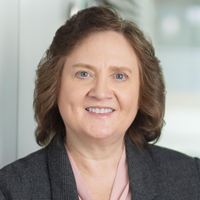
Associate Vice Chancellor and Director of the AI Tennessee Initiative at the University of Tennessee
The Computing Research Association (CRA) has selected Lynne Parker as the recipient of the 2023 CRA Distinguished Service Award for her unparalleled impact on the computing research community.
Parker has made numerous outstanding contributions over the course of six years in federal government positions, leading national artificial intelligence (AI) policy across the Executive Branch and fashioning key strategic policies in support of AI research, development, and deployment.
As Division Director of Information and Intelligent Systems at the National Science Foundation (NSF) Computer and Information Science and Engineering Directorate (CISE), Parker demonstrated technical vision and the ability to forge new national-scale research initiatives and teams across the CISE directorate, NSF, and government agencies. She took a leadership role in several new cross-agency federal research initiatives while founding a new Networking and Information Technology Research and Development program (NITRD) interagency working group on Robotics and Intelligent Systems. She conceived and led the development of several new strategic research initiatives, including the Smart and Autonomous Systems program, the re-visioning of the National Robotics Initiative, and the development of NSF’s new Big Idea on “The Future of Work at the Human-Technology Frontier.”
Parker co-led the 2016 NITRD effort that produced the National AI R&D Strategic Plan, which “establish[ed] a set of objectives for Federally-funded AI research.” The plan was extremely impactful and established national directions and intent during a time of growing concern about U.S. research leadership in AI. It has transcended three U.S. Administrations, spanned political ideologies, and also served as a model that dozens of nations around the world have adopted.
In 2018, Parker joined the White House Office of Science and Technology Policy (OSTP) as the Assistant Director for AI, and later became Deputy U.S. Chief Technology Officer in 2019, as well as Founding Director of the National AI Initiative Office in 2021. In these roles, Lynne served as the White House lead for national AI policy, managing efforts to promote and foster the nation’s leadership in AI for economic growth, improved quality of life, and national security.
Parker has displayed strategic vision, dedication, and forward-looking perspective while leading the nation’s strategic approach to AI research, workforce development, and infrastructure.
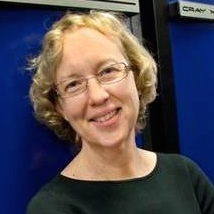 Katherine Yelick
Katherine Yelick
Robert S. Pepper Distinguished Professor of Electrical Engineering and Computer Science at the University of California, Berkeley
The Computing Research Association (CRA) selected Katherine Yelick as the recipient of the 2022 CRA Distinguished Service Award for her outstanding and sustained service contributions to the computing research community.
Yelick has earned the reputation of the “go-to” person for advice to the government and the agencies within it, and to institutions of higher education on all aspects of advanced computing. She is respected for her sound judgment, her broad knowledge of computing research, and her willingness to work hard and get things done.
Yelick’s affiliation with the Lawrence Berkeley National Laboratory (LBNL), which complements her role as a tenured professor at University of California Berkeley, began with her appointment as a research scientist in 1996. She was appointed National Energy Research Scientific Computing (NERSC) Division Director in 2008. In 2010, she became Associate Laboratory Director (ALD) for Computing Sciences, the first computer scientist to serve in that role. She stepped down from that position at the end of 2019 and now assists the LBNL Director as Senior Advisor for Computing.
At the national level, Yelick worked with senior managers across the Department of Energy (DOE) national lab complex to launch the Exascale Computing Initiative, the largest DOE project of its kind. She also provided congressional testimony on “Big Data Challenges and Advanced Computing Solutions,” for the U.S. House Science, Space, and Technology Committee in 2018. Additionally, she served on the Computer Science and Telecommunications Board from 2011 to 2017 and contributed to the National Research Council of the National Academies of Science, Engineering, and Medicine. She also served on CRA’s Computing Community Consortium Council from 2015-2018.
Yelick has led efforts toward diversity, equity, and inclusion – important attributes for the future of our field. At LBNL, she improved the gender balance at all levels – postdocs, student interns, and professional leadership roles. At Berkeley, she has been the equity officer for faculty recruiting since 2014 and has been effective in leading the EECS faculty to diversify the ladder faculty through selection and successful recruitment of new faculty members.
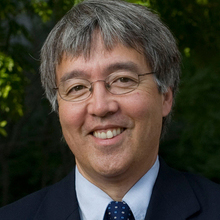 James Kurose
James Kurose
Distinguished University Professor, University of Massachusetts-Amherst
James Kurose was selected to receive the 2021 Distinguished Service Award in recognition of his exemplary service to the computing research community. Through a career spanning more that 35 years, he has distinguished himself as national leader in numerous impactful service roles in the computing research community. In every setting, Kurose has brought his tireless energy, enthusiasm, and extraordinary collegiality to build community, and strengthen our field.
His visionary leadership as Assistant Director for Computer and Information Science and Engineering at NSF in launching new programs and initiatives across a broad spectrum of computing disciplines has benefited nearly every computing researcher in the United States. Kurose’s service as Assistant Director for Artificial Intelligence at the Office of Science and Technology Policy, co-Chair of the National Science and Technology Council NITRD National Artificial Intelligence Research and Development Strategic Plan, and for the international Organization for Economic Cooperation and Development as well as other groups has advanced and elevated our field. As part of his AI leadership on behalf of the community, he led an all-of-government effort to conceptualize and launch the National AI Research Institutes, a centerpiece of the American AI Initiative. The huge success of the National AI Institutes program is directly attributable to Kurose’s insightful and persistent leadership.
The CARES Movement
The Committee to Aid Reporting on Discrimination and Harassment Policy Violations (CARES)
The CARES movement was selected for positively transforming the computing research community rapidly and fundamentally. CARES provides a resource for helping people experiencing issues related to discrimination, harassment, or bullying. The role of CARES is to “serve as a resource comprising well-known and respected people in the architecture community who are approachable and willing to listen and help people who experience discrimination and harassment” at SIGARCH and SIGMICRO events. CARES members agree to be a sounding board for these people and can provide advice on the steps necessary to have the matter further investigated by parent organization ACM. In addition to addressing this specific and pressing need, CARES has also served to mobilize and engage the entire computer architecture community, resulting in a more inclusive and supportive environment for all.
The first CARES committee was founded by the 2018 ACM SIGARCH Officers, led by Sarita Adve, in response to a longstanding and disturbing reality of gender bias and sexual harassment in the computer architecture community, which were brought to the forefront in blog posts by Natalie Enright-Jerger, Kim Hazelwood, and Kathryn S McKinley, and by a statement at MICRO by Margaret Martonosi.
The CARES movement has rapidly spread to other research areas where it is having a similarly transformative impact. In particular, many other ACM SIGs have or are setting up their own CARES committees modeled after SIGARCH CARES. CARES is also expanding beyond ACM – a CARES committee is being developed for the IEEE Robotics and Automation Society, the theory community, and IEEE leadership is interested in exploring this model for other societies.
The transformative work of CARES is not only aimed at calling attention to issues of sexual harassment and gender bias in the computing research field, but also in identifying and taking positive steps to make our research communities and conferences more welcoming.
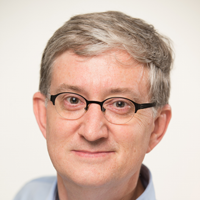
Edward Felten
Professor of Computer Science and Public Affairs at Princeton University
Edward Felten has tirelessly worked at the intersection of computer science and policy, fighting to retain the “freedom to tinker,” amongst other things. “Freedom to Tinker” is also the name of his influential blog, which contains research and expert commentary on digital technologies in public life.
Felten consulted for the Federal Trade Commission (FTC) and went on to become its first chief technologist during the Obama administration. He had a significant role in important FTC initiatives about privacy, net neutrality, and other policy issues relating to information technology. In 2015, Felten went on to serve as deputy United States chief technology officer in the Office of Science and Technology Policy. He was in charge of shaping the Obama administration’s AI policy, including chairing its “Preparing for the Future of Artificial Intelligence” report.
Felten currently serves as a member of the U.S. Privacy and Civil Liberties Oversight Board, which oversees executive branch policies and procedures related to protecting the nation from terrorism, in order to ensure the protection of privacy and civil liberties.

Photo Credit: Argonne National Laboratory
Paul Messina
Director, Computational Science Division, Argonne National Laboratory
Paul Messina was selected as the 2018 recipient of the CRA Distinguished Service Award for his significant contributions to the advancement of high performance computing and decades of service to the field. Messina has an incredible record of building and managing large-scale, diverse research activities. Over the course of his career, he has designed, directed, and otherwise executed numerous initiatives that have influenced U.S. policy and programs resulting in the U.S. leadership position in high-performance computing.
His impact extends beyond the research community to the government, where he has helped manage the stewardship of our nation’s nuclear weapons stockpile, served on innumerable advisory panels, and led the Department of Energy’s (DOE) Exascale Computing Project (ECP) – the key to the success of the National Strategic Computing Initiative (NCSI). Under his leadership, Messina created, organized, and guided the ECP to accelerate delivering the US’s first exascale computer in the early 2020s, its systems software and programming tools, and mission-critical applications at unprecedented scale.
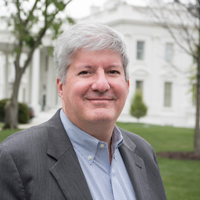 Tom Kalil
Tom Kalil
Former Deputy Director for Technology and Innovation, White House Office of Science and Technology Policy
Tom Kalil was selected as the 2017 recipient of the CRA Distinguished Service Award for his long history of leading national initiatives that have had transformational impact on the computing research community and as an exemplary spokesperson, advocate, and collaborator for the computing research community.
Tom has served as the National Economic Council’s “point person” on a wide range of science, technology and innovation issues, including the National Nanotechnology Initiative, the Next Generation Internet, liberalization of computer export controls, and education technology. At the White House Office of Science and Technology Policy, Tom supervised a team of 19 policy entrepreneurs working science, technology and innovation policy issues such as President Obama’s Strategy for American Innovation, grand challenges, incentive prizes, STEM education, the maker movement, high-growth entrepreneurship, Lab-to-Market, space policy, innovation for global development, R&D funding, insights from the social and behavioral science, and national S&T initiatives in areas such as advanced manufacturing, big data, cyber-physical systems, nanotechnology, robotics, software-defined networks, and synthetic biology.
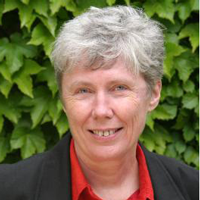 Maria Klawe
Maria Klawe
President, Harvey Mudd College
Maria Klawe was selected as the 2016 recipient of the CRA Distinguished Service Award for her tireless commitment to and profound impact on the computing research community. Klawe is the president of Harvey Mudd College and has previously served as president of the Association for Computing Machinery. She helped Anita Borg and Telle Whitney establish the Institute for Women in Technology (now the Anita Borg Institute) and served as board chair.
Maria has used her leadership positions to strengthen the research discipline of computer science and to establish new norms and policies to increase the percentage of women and minorities in computer science and technology. She is dedicated to increasing the percentage of women and under-represented minorities in STEM, with a focus on increasing computing researchers and engineers. In 2004, Maria and Nancy Leveson were the recipients of the CRA A. Nico Habermann award in recognition for their roles as founding co-chairs of the highly successful CRA-W Committee.
Farnam Jahanian
 President, Carnegie Mellon University
President, Carnegie Mellon University
Farnam served as NSF Assistant Director for CISE from 2011 to 2014, the highest profile government position for computer science research. During his tenure he fought hard for computer science and launched three presidential initiatives: National Robotics Initiative, Big Data Research and Development Initiative and US Ignite. Farnam led twenty-five new solicitations, including several cross-directorate efforts such as secure and trustworthy cyberspace, cyberlearning and future learning technologies, and big data. He reintegrated the Office of Cyber Infrastructure (OCI) with CISE. Farnam served as co-chair of the NITRD subcommittee of the National Science and Technology Council Committee on Technology, providing overall coordination for the R&D activities of 17 government agencies. He often testified before congress and gave about 100 presentations at universities and conferences.
Former NSF director and current CMU president Subra Suresh writes “Farnam is both a visionary and the pragmatist, and this combination of qualities has allowed him to be effective in whatever he undertakes.”
Tom Kalil, OSTP Deputy Director for Technology and Innovation states “During my more than thirteen years of service at the White House for two Presidents, I have had the opportunity to work with many individuals from the computer science research community who have been willing to serve in leadership positions at federal agencies such as NSF, DARPA, and the Department of Energy. Farnam has been second to none as measured by the breadth and depth of his impact on the direction of the field, and his ability to partner effectively with the research community, and his peers at NSF and other agencies, and the White House. His leadership and hard work has resulted in increased federal investment in critical areas such as Big Data, robotics, cyberphysical systems, cybersecurity, cyber-learning, next-generation networking, and CS education.”
Vinton G. Cerf
 President of ACM
President of ACM
Vint Cerf has served on a number of international committees and used his influence to guarantee a healthy development of the Internet. As ARPA program manager in the 70’s, he helped develop and promote the basic packet technology that enabled the Internet. In 1992, he co-founded the Internet Society helping to develop the best protocols and standards for the fast growing network. Cerf chaired the board of ICAAN (2000-2007) and currently chairs the board of ARIN, organizations that coordinate domain naming. He has been a major promoter of IPV6. Vint has served on PITAC, chaired the visiting committee on advanced technology for NIST and now sits on the National Science Board. Vint currently serves as president of the ACM and sits on several advisory boards.
The Internet was Vint’s baby and as a proud parent, Vint continued to work diligently to oversee its childhood and adolescence to go on to become the great network we have today.
Peter G. Neumann
 Principal Scientist at SRI International
Principal Scientist at SRI International
The CRA Board of Directors has selected Peter G. Neumann, Principal Scientist at SRI International, for the Computing Research Association’s 2013 Distinguished Service Award. Neumann was selected in recognition of the outstanding contributions to advancing the field of computing that he has made during half of a century of service and dedication.
Neumann has led and driven the fields of computer-related risk and socially-responsible use of information technologies. These activities have also had an enormous impact on computing science research and remain at the forefront today. Neumann has been in SRI’s Computer Science Lab since September 1971. He continues to moderate the ACM Risks Forum, wasresponsible for CACM’s Inside Risks columns monthly from 1990 to 2007, and chairs both the ACM Committee on Computers and Public Policy and the National Committee for Voting Integrity. He is a Fellow of the ACM, IEEE, and AAAS, and is also an SRI Fellow.
Susan L. Graham
 Pehong Chen Distinguished Professor Emerita at UC Berkeley
Pehong Chen Distinguished Professor Emerita at UC Berkeley
The CRA Board of Directors has selected Susan L. Graham, Pehong Chen Distinguished Professor Emerita at UC Berkeley, for the Computing Research Association Distinguished Service Award 2012. Graham was selected in recognition of the extraordinary contributions that she has made over more than three decades of dedicated and selfless service and leadership.
Graham has served on countless departmental review committees, editorial committees, award selection committees, advisory committees, program committees, and search committees for both the NSF Assistant Directorship for CISE and the Harvard Presidency. She served on the President’s Information Technology Advisory Committee (PITAC) from 1997-2003; on the Working Group of the President’s Council of Advisors on Science and Technology to assess the Federal Networking and Information Technology Research and Development Program in 2010; and has been Vice Chair of the Computing Community Consortium from 2006-present.
As a member of PITAC, in addition to providing important guidance on the “mainstream” work of the committee, Susan served as Co-Chair of the Subcommittee on Open Source Software for High-End Computing, and as Co-Chair of the Subcommittee on Learning and Education. These activities helped to establish the foundation for today’s view of computer science as an expansive discipline whose advancements are essential to all aspects of our lives.
As a member of a Working Group of the President’s Council of Advisors on Science and Technology (PCAST) to assess the Federal Networking and Information Technology Research and Development Program, Susan was instrumental in creating the outline of the report, assigning the sections, editing the member contributions into a coherent whole, writing the crucial Executive Summary, dealing with the politics of comments and revisions, and marketing the report in Washington. While many others made important contributions, the co-chair of the working group stated, “I can say with utter certainty that there would have been no PCAST report without Susan.”
Jeannette M. Wing
 President’s Professor of Computer Science and Head, Computer Science Department, Carnegie Mellon University
President’s Professor of Computer Science and Head, Computer Science Department, Carnegie Mellon University
The CRA Board of Directors has selected Jeannette Wing, President’s Professor of Computer Science and Head, Computer Science Department, Carnegie Mellon University, to receive the 2011 Distinguished Service Award.
Wing was nominated for the award for her national and international thought leadership with respect to Computational Thinking, and for her extraordinary performance as NSF Assistant Director for CISE from 2007‐2010. Articulating the notion of Computational Thinking has been influential in identifying how computing research is indeed far different from computing per se. That is, the way key problems in biology and other sciences, for example–are considered now is in terms of core computational notions such as abstraction, exponentials, and more.
Wing’s leadership at NSF came at a crucial time both scientifically and politically. She has been deeply involved in a set of major NSF programs including Cyber-Enabled Discovery and Innovation, Expeditions in Computing, Trustworthy Computing, Data-Intensive computing, and more. These have helped push research in numerous new directions, and they have been essential in further establishing computing research as a cornerstone of NSF’s full research portfolio and as a critical dimension of America’s innovation economy. In the words of Peter Lee, Managing Director of Microsoft Research Redmond, “[Simply,] Jeannette’s service work has touched, in a tangible and positive way, virtually every working academic computer science researcher.”
Moshe Y. Vardi
 Karen Ostrum George Professor in Computational Engineering and Director of the Ken Kennedy Institute for Information Technology at Rice University
Karen Ostrum George Professor in Computational Engineering and Director of the Ken Kennedy Institute for Information Technology at Rice University
The CRA Board of Directors has selected Moshe Y. Vardi, the Karen Ostrum George Professor in Computational Engineering and Director of the Ken Kennedy Institute for Information Technology at Rice University, to receive the 2010 Distinguished Service Award.
Moshe was nominated for the award for two fundamental contributions to the computing research community. The first was leading the effort to produce a definitive report on offshoring that has contributed significantly to debunking myths about the future health of the computing field and, in the process, helped ensure a steady flow of the best and brightest students into computer science.
The ACM report, Globalization and Offshoring of Software, remains a core reference underpinning the arguments many of us continue to make that the study of computer science is a viable endeavor and one that leads to fulfilling and rewarding careers. Doing this study was not only a great service to the research community at the time, but – as it has turned out – something that is serving the community long beyond the time frame initially envisioned.
Moshe’s second contribution was leading the effort to redefine Communications of the ACM with the Goal of engaging the computing research community to create a compelling magazine for computing. Today, eighteen months into the new CACM, the evidence is overwhelming that Moshe has been successful with the revitalization of CACM. Whether it is the hundreds of blog posts praising the new CACM – or the fact that cover stories like October’s “The Status of the P Versus NP Problem” are being picked up by the New York Times – Moshe has indeed created a Science for computing which serves the computing research community well. And as was pointed out in the nomination, “He [Moshe] has done this not because of any allegiance to ACM, but because of his deep commitment to serving our field.”
Eugene H. Spafford
 Professor of Computer Sciences and Executive Director of CERIAS at Purdue University
Professor of Computer Sciences and Executive Director of CERIAS at Purdue University
The CRA Board of Directors has selected Eugene H. Spafford, Professor of Computer Sciences and Executive Director of CERIAS at Purdue University, to receive its 2009 Distinguished Service Award.
Eugene H. Spafford has been an effective and tireless advocate for the cause of information security research. He has been instrumental in keeping public attention on this important research area. He has helped educate the research community, policy-makers, and the public on the impact that improved computer security can have on our lives and he has shown exceptional leadership in promoting these ideas. Professor Spafford has been a frequent witness in congressional hearings and has influenced decisions in the Executive Branch through his membership on PITAC. He continues to exercise leadership through his membership in USACM. The award will be presented to Professor Spafford at the ACM Awards Banquet on June 27 in San Diego.
Rick Adrion
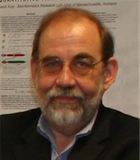 Professor of Computer Science at UMass Amherst, Co-Director of RIPPLES, Co-Director of the Commonwealth Information Technology Initiative (CITI), and Director of CRICCS.
Professor of Computer Science at UMass Amherst, Co-Director of RIPPLES, Co-Director of the Commonwealth Information Technology Initiative (CITI), and Director of CRICCS.
Adrion was recognized for his sustained record of effective and significant service contributions spanning more than two decades. He has played a key role in building, nurturing and shaping today’s computer science community. Among these contributions are leadership in the development of the Internet; leadership in setting strategic directions at the National Science Foundation; leadership in developing a stronger political voice for computer science in national politics; leadership in strengthening the software engineering community; leadership in strengthening, modernizing and invigorating computing and information technology programs in Massachusetts public higher education; and overall service to the computer science community. Rick Adrion was general chair of the first ACM/CRB Conference on Strategic Directions in Computing. He also played a leadership role in the formation of CRA and was an active board member for many years, serving on the Executive Committee and Government Affairs Committee.
Rick Adrion is Professor of Computer Science at UMass Amherst, Co-Director of RIPPLES, Co-Director of the Commonwealth Information Technology Initiative (CITI), and Director of CRICCS. He served as Division Director for Experimental and Integrated Activities in the NSF Directorate for Computer and Information Science and Engineering (CISE) from January 2000 through August 2002 and as a part-time Senior Advisor in CISE until September 2003.
Peter A. Freeman
 Washington Advisory Group, Washington, DC; previously Assistant Director of NSF for CISE
Washington Advisory Group, Washington, DC; previously Assistant Director of NSF for CISE
Peter A. Freeman, recently named a director at the Washington Advisory Group in Washington, DC, was selected for his service as Assistant Director of NSF for CISE over the past four years. He assumed the CISE position in 2002, following 12 years as Dean of the College of Computing at Georgia Institute of Technology and a term as Chief Information Officer for the Institute.
During his tenure at NSF, Freeman brought about dramatic changes in the directions and support of computing research. He reduced the number of CISE divisions and programs, and clustered the remaining programs to create more effective and flexible program management and, ultimately, better service to computing researchers. He also shepherded the move of the Shared CyberInfrastructure Division (SCI) out of CISE and into the Office of the Director.
Peter Freeman was largely responsible for three additional major initiatives that will change the face of computing research over the next two decades. He introduced the Global Environment for Networking Innovations (GENI) initiative, which will redefine networking globally as we know it. The Computing Community Consortium (CCC) will bring together computing community leaders to determine research directions and infrastructure needs in a fashion that will allow the CISE community to compete effectively against other S&E disciplines for limited research and infrastructure funds. And the Broadening Participation (BPC) program (funded at unprecedented levels) will develop the diverse human capital necessary to sustain the U.S. computing research enterprise.
John E. Hopcroft
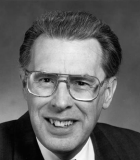 IBM Professor of Engineering and Applied Mathematics in Computer Science at Cornell University
IBM Professor of Engineering and Applied Mathematics in Computer Science at Cornell University
In the late 1960s and early 1970s he was involved in broadening SIAM’s scope to include computing. When the IEEE and ACM started conferences such as FOCS and SIGACT, Hopcroft served on the program committees, first as a member and then as chair. He was one of the founding editors, and later managing editor, of SIAM’s prestigious journal SICOMP. He subsequently served on the Board of Directors of SIAM (1989-97) and as chairman of the board (1992-93). At NSF, Hopcroft was active on various NSF advisory boards, including the National Science Board, where he chaired the Committee on Program and Plans that oversaw all major science funding, including computer science programs and the supercomputing centers. He was instrumental in this committee making the decision to privatize the Internet.
Hopcroft has served on many advisory boards, including NASA’s SSAAC which helped prioritize space research missions after the Challenger disaster. He has served professional organizations such as AAAS where he has served as chair of Section T on Information, Computing and Communications (1988-91) and as council delegate from 1998 to the present. He has served as editor for a number of leading journals; on advisory boards for academic departments such as Princeton, Yale, CMU, USC, and UC Berkeley; and on numerous review committees. Hopcroft helped the Vietnam Educational Foundation build computer science education in Vietnam, and currently is working with the Millennium Foundation, with support from the World Bank, to help build science infrastructure in Chile.
Mary Jane Irwin
 Evan Pugh Professor and Co-director of the Embedded and Mobile Computing Center (emc2) in the CSE Department at Penn State University
Evan Pugh Professor and Co-director of the Embedded and Mobile Computing Center (emc2) in the CSE Department at Penn State University
Mary Jane Irwin, Evan Pugh Professor and Co-director of the Embedded and Mobile Computing Center (emc2) in the CSE Department at Penn State University, has served at high levels with distinction in three of the main computing research professional organizations. She was a long-time and active member of the CRA board and vice-chair for four years; a member of council and vice president of ACM; and a member of council of the IEEE Computer Society.
Irwin played a fundamental role in founding CRA-W, and has continued to be active in this leading organization for more than a decade. She has helped to set the future research agenda for the computer architecture community by co-chairing CRA’s grand challenge conference in this area. Her record of participation in professional publications and conference activities is unusually rich.
David Patterson
 Professor of Computer Science at the University of California, Berkeley
Professor of Computer Science at the University of California, Berkeley
David Patterson, Professor of Computer Science at the University of California, Berkeley, has a wide range of service activities in addition to being a leading computing researcher. He served for four years as CRA’s board chair, during which he revitalized the membership of the board, greatly strengthened the financial abilities of the organization so it could better carry out work on behalf of the computing research community, and oversaw an expansion and strengthening of the programs, in particular in government affairs and representation of women.
As current president of ACM, Patterson has used his standing to speak out forcefully and effectively for improving the innovation climate in the United States through his efforts to return DARPA to a more basic research agenda, increasing federal funding for computing research and development, making the United States a more welcoming place to foreign students and researchers, and encouraging American students to pursue a computing research career.
Edward Lazowska
Defense Advanced Research Projects Agency’s Information Science and Technology (ISAT), President’s Information Technology Advisory Committee, CRA’s Government Affairs Committee
Ed Lazowska is widely recognized for his incredible effectiveness, unbridled enthusiasm, and overwhelming energy. He has furthered the computing research agenda in so many ways that are simply transparent to the entire community. Only a few of his many contributions are mentioned here.
Lazowska is a Member of the NAE; and a Fellow of the ACM, IEEE, AAAS, and the American Academy of Arts & Sciences. Currently he co-chairs the President’s Information Technology Advisory Committee. From 1992-2004, he was a member of the CRA Board of Directors, serving as chair from 1997-2001; Ed is currently a co-chair of CRA’s Government Affairs Committee. He has long been involved with ACM activities, where he served as a member (and 1999-2000 chair) of ACM’s A.M. Turing Award selection committee and as a member of the ACM Council. From 1995-2000, Ed served on (and in 1998 and 1999 he chaired) the National Science Foundation’s Advisory Committee for Computer and Information Science and Engineering. He has testified before the U.S. House Appropriations Committee concerning NSF and the U.S. House Science Committee concerning HPCC.
Lazowska chairs the Defense Advanced Research Projects Agency’s Information Science and Technology (ISAT) study group and served as a member from 1998-2001; he also chairs the Peer Committee for Section 5 (Computer Science & Engineering) of the National Academy of Engineering. He is a member of the Executive Advisory Council of the National Center for Women and Information Technology, and also has served on a number of industry advisory boards.
Recently Ed completed six years of service on the National Research Council’s Computer Science and Telecommunications Board (CSTB), and served on the NRC Committee on Improving Learning with Information Technology. In addition, Ed served on the NRC Committee on Science and Technology for Countering Terrorism—Panel on Information Technology, as well as contributing extensively to the creation of the CSTB summary report “Innovation in Information Technology.”
In the words of one supporter of his nomination: “Ed Lazowska is a most worthy recipient of the CRA Distinguished Service Award given his prodigious service to our community over multiple decades. He has served on more committees with national impact than almost any other computer professional I know, and continued to do so even while he was the highly proactive chairman of the University of Washington’s distinguished computer science department.”
David Clark
 CSTB
CSTB
David Clark has deployed his technical expertise and scientific work in networking to serve the CS community in three arenas: 1) through Internet leadership and policy work, 2) through education, and 3) in service on the National Research Council’s Computer Science and Telecommunications Board.
Clark’s Internet leadership reaches back to the 1970s and includes: Head, Internet Configuration Control Board, subsequently the Internet Activities Board and Internet Architecture Board; leadership of the Internet Research Steering Group, including involvement with the Internet Engineering Task Force; one of framers of end-to-end arguments; and nurturance of nation-wide collaborations among network researchers, through SIGCOMM and less formally.
Clark’s service on CSTB, which dates back to 1987, has been extensive. He has chaired CSTB since 1996, helping to grow the Board’s program and impact. In addition, he: 1) chaired the project that produced the report, Computers at Risk; 2) served on all the Internet series committees, which together yielded four reports; and 3) was instrumental in developing the fundamentals of computer science and innovation in information technology projects.
Though a research scientist, Clark has produced many Ph.D.s, and has been responsible for the cultivation and support of several, now well known, women in the field.
The nomination statement ends by saying, “Clark has received a variety of honors and awards for his technical accomplishments. That he has balanced an ongoing program of research, continuously contemplating new approaches to network architecture, with an expanding set of service activities attests to his versatility and his commitment to the field.”
Barbara Simons
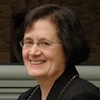 ACM US Public Policy Committee (USACM)
ACM US Public Policy Committee (USACM)
Barbara Simons, over the past 20 years, has served not only the computer science community, but also the general public through her advocacy of the responsible use of technology by government and business interests, her efforts in developing and supporting programs to increase the participation of women and minorities in the computing profession, and her work on behalf of scientific freedom and human rights.
Simons has served the ACM community extensively, including as President (1998-2000) and Secretary (1990-92), as well as Vice-Chair of SIGACT, Chair of ACM’s Scientific Freedom and Human Rights Committee, and Member of ACM’s Committee on Central and Eastern Europe. She established the ACM US Public Policy Committee (USACM) in 1993 and currently serves as Co-Chair.
Simons has been a strong advocate for individual rights, especially in the areas of privacy and anonymity, and she has often testified before state and national legislatures and at government-sponsored hearings, bringing a computing expert’s perspective to important political decisions. Her nominators note that she “formulated and was often the first person to present to the community many of the issues surrounding computer security, privacy, the Digital Millennium Copyright Act, encryption, E-Voting, and Total Information Awareness.”
Simons’ work to increase diversity in computing includes: Co-founding the Reentry Program for Women and Minorities in the Computer Science Department at U.C. Berkeley; Membership on the Board of the Coalition to Diversify Computing, a joint CRA/ACM/IEEE-CS committee that works at increasing participation of underrepresented minorities in computer science; participation in the Richard Tapia Conference to Celebrate Diversity in Computing and the Grace Hopper Celebration of Women in Computing.
One of her nominators notes, “What is most astounding about Barbara’s contributions is the fact that she did all of this work outside of her regular job. In some cases, the Distinguished Service Award has gone to individuals for whom service is part of their regular job. Barbara is truly an example of dedication to the computer science community.”
Ruzena Bajcsy
 Director of the Center for Information Technology Research in the Interest of Society (CITRIS) at the UC campuses of Berkeley, Davis, Merced, and Santa Cruz
Director of the Center for Information Technology Research in the Interest of Society (CITRIS) at the UC campuses of Berkeley, Davis, Merced, and Santa Cruz
Ruzena Bajcsy has been Director of the Center for Information Technology Research in the Interest of Society (CITRIS) at the UC campuses of Berkeley, Davis, Merced, and Santa Cruz since November 2001.
From December 1998 to September 2001, Dr. Bajcsy served as Assistant Director of NSF’s Directorate for Computer and Information Science and Engineering (CISE). During her tenure at NSF, she was instrumental in helping to establish the Foundation’s Information Technology Research (ITR) program that funds innovative, high-impact research in information technology. As a result of ITR funding, CISE’s research budget grew by about 50 percent, the largest increase in the history of CISE. Dr. Bajcsy was very effective in making the case that the bulk of this money, especially in the first year, go to researchers in computer science and engineering.
Ruzena Bajcsy has a record of more than 30 years of contributions to the computing field as a scientist and administrator. She is a pioneering researcher in machine perception, robotics, and artificial intelligence. Bajcsy is currently a professor in both the CIS Department and the Mechanical Engineering and Applied Mechanics department at Berkeley; she also directs the University of Pennsylvania’s General Robotics and Active Sensory Perception Laboratory, which she founded in 1978.
Prior to her service as Assistant Director at NSF, Dr. Bajcsy spent nearly 20 years at the University of Pennsylvania, including five years (1985-1990) as the chair of the Computer and Information Sciences Department. During her career, Dr. Bajcsy has also been active on the editorial boards of many major journals, and served as chair or member of scores of major conferences and workshops.
Among many honors received, Bajcsy is a member of both the National Academy of Sciences’ Institute of Medicine and the National Academy of Engineering, and she is a Fellow of the AAAI, IEEE, and ACM. She received the ACM A. Newell Award in 2001.
Andries van Dam
 Thomas J. Watson, Jr., University Professor of Technology and Education and Professor of Computer Science at Brown University
Thomas J. Watson, Jr., University Professor of Technology and Education and Professor of Computer Science at Brown University
Andries van Dam is the Thomas J. Watson, Jr., University Professor of Technology and Education and Professor of Computer Science at Brown University. He has been on Brown’s faculty since 1965, and was one of the department’s founders and its first chairman from 1979 to 1985. He is a principal investigator, and was the director from 1996-98, in the NSF Science and Technology Center for Graphics and Visualization, a research consortium including Brown, Caltech, Cornell, North Carolina (Chapel Hill), and the University of Utah.
Professor van Dam, who served as CRA’s board chair from 1985-87, was nominated because of his extensive influence over a number of years in many different areas. He has shown leadership in his sub-discipline and in the computing field as a whole. He has helped to establish several new disciplines, including graphics, hypertext, and distributed computing. He co-founded ACM SIGGRAPH, as well as the Institute for Research for Information and Scholarship and the Technology Center for Advanced Scientific Computing and Visualization, both at Brown University.
Professor van Dam has served on the technical advisory boards of several companies, including Microsoft Research, and on several NSF and NAE advisory committees—ACM Curriculum ‘68; CRA; CSTB; NSF/CISE Advisory Committee; NAE Committee on Engineering Education; and CS departmental advisory committees (Georgia Tech and Princeton). He has promoted standards in the graphics community, and served as editor of multiple journals, such as ACM Transactions on Graphics; Computer Graphics and Image Processing; and IEEE Transactions on Visualization and Computer Graphics.
Andy van Dam has inspired large numbers of students to go into academic and industrial research careers. He has been involved with many startup companies as an advisor. His written contributions are prolific, and he has received numerous awards for technical work, including ACM Karl V. Karlstrom Award; IEEE James H. Mulligan, Jr., Education Medal; the ACM SIGSCE Award for Outstanding Contributions to Computer Science Education; the SIGGRAPH Steven A. Coons Award, and the 2001 Harriet W. Sheridan Award for Distinguished Contribution to Teaching and Learning.
Professor van Dam is a Fellow of IEEE, ACM, and the American Academy of Arts and Sciences, and a member of NAE. He received the B.S. degree with Honors in Engineering Sciences from Swarthmore College in 1960, and the M.S. and Ph.D. from the University of Pennsylvania in 1963 and 1966, respectively. He holds honorary Ph.D.s from Swarthmore and Darmstadt Technical University. Additional information is available on his website at:http://www.cs.brown.edu/people/avd/
Marjory Blumenthal
Executive Director of the National Research Council’s Computer and Telecommunications Board (CSTB)
Marjory did her undergraduate work at Brown University and her graduate work at Harvard University as an NSF Fellow. She was a project director for the congressional Office of Technology Assessment, and she also worked for GE Information Services as Manager of Competitive Analysis and Planning. In 1998, Marjory spent a sabbatical as a Visiting Scientist at MIT LCS, where she developed and taught a course on public policy for computer science graduate students.
Marjory is a member of the Santa Fe Institute Science Board, the Advisory Board of the Pew Internet & American Life Project, the Carnegie Endowment for International Peace Study Group on the Information Revolution and World Politics, and the ACM, AEA, and IEEE.
More biographical information is available on the Web at http://www.cstb.org
Juris Hartmanis
 Walter R. Read Professor of Engineering at Cornell University
Walter R. Read Professor of Engineering at Cornell University
From 1990 to 1992, Dr. Hartmanis chaired the Study of the Scope and Direction of Computer Science for the Computer Science and Telecommunications Board of the National Research Council. This study resulted in the influential volume Computing the Future: A Broader Agenda for Computer Science and Engineering, which had a major impact on the computing research community’s ability to look outward.
Juris Hartmanis recently completed a two-year term as the Assistant Director of the National Science Foundation (NSF) for Computer and Information Science and Engineering (CISE). During his tenure, he effectively positioned NSF and CISE to assume a leadership role in response to the President’s Information Technology Advisory Committee (PITAC) report. He was instrumental in shaping the discussion that led to NSF’s playing the lead role in the Information Technology Research (ITR) program.
More biographical information can be found at the Cornell University Computer Science’s website.
Dr. Hartmanis received his award at CRA’s Snowbird Conference 2000 on July 10, 2000.
Bill Joy
 Chief Scientist at Sun Microsystems Inc.
Chief Scientist at Sun Microsystems Inc.
Bill Joy is the inventor/co-inventor of many of Sun’s technologies (including Sun’s Network File System, Sparc Microprocessor Architecture, Java, and Jini technologies) and business strategies (open systems, “The Network is the Computer,” Java licensing strategy, and Community Source licensing (for Jini).
Bill Joy’s current research involves new uses of distributed computing enabled by using Java and Jini, new methods of human-computer interaction, new microprocessor and system architectures, and the uses in computing of scientific advances in areas such as complex adaptive systems, quantum computing, and the cognitive sciences.
Ken Kennedy
 Ann and John Doerr Professor in Computational Engineering at Rice University
Ann and John Doerr Professor in Computational Engineering at Rice University
Professor Kennedy has chaired and served as a member of a number of National Research Council/National Academy of Engineering bodies. He has also been appointed to advisory committees for the White House, Congress, the National Science Foundation, and DARPA. He has taken a leadership role in conferences and workshops, and serves on several editorial boards.
Ken Kennedy is a member of the National Academy of Engineering, and a Fellow of the American Association for the Advancement of Science, the Institute of Electrical and Electronics Engineers, and the Association for Computing Machinery.
Dr. Merrell Patrick
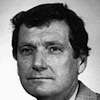 Chief Science and Technology Officer for the Directorate for Computer and Information Science Engineering (CISE), NSF
Chief Science and Technology Officer for the Directorate for Computer and Information Science Engineering (CISE), NSF
Previously, he served as acting executive officer for CISE, as High-Performance Computing and Communications (HPCC) coordinator, and as program director for New Technologies. At NSF, he also helped draft the National Science and Technology Council Committee on Information and Communications Strategic Plan for Federal Information and Communications Research and Development. At the Department of Energy, Dr. Patrick supervised the Academic Strategic Alliance Program of the Accelerated Strategic Computing Initiative (ASCI).
Anita Jones
 University Professor at the University of Virginia, Charlottesville, Virginia
University Professor at the University of Virginia, Charlottesville, Virginia
Professor Jones is the first computer scientist (and the first woman) to ever hold that prestigious position. Professor Jones has always been concerned with the health of science and engineering research in the United States, and as DDR&E she has created a legacy of tremendous positive impact with respect to improving the national infrastructure necessary to perform that research.
Anita Jones received a B.A. in Mathematics from Rice University, an M.A. in English Literature from the University of Texas, and a Ph.D. in Computer Science from Carnegie-Mellon University in 1973. She was an Assistant Professor of Computer Science at Carnegie-Mellon until 1978, when she was promoted to Associate Professor. During 1981-87 she was co-founder and vice-president of Tartan Laboratories, a successful software company. Professor Jones has devoted a total of 15 years of combined service on the Air Force Science Advisory Board, and the Defense Science Board, the latter being the most senior of the external advisory bodies to the U.S. Department of Defense.
In 1988 Professor Jones came to the University of Virginia as Professor and Chair of the Department of Computer Science. Her vision, leadership, and superb mentoring of junior faculty were instrumental in forging a top-notch computer science research program at Virginia. In 1994 Professor Jones was elected to the National Academy of Engineering, and in 1996 she was named IEEE Fellow. Anita Jones’ technical interests focus on the design and construction of programmed systems. She has designed protection mechanisms and built secure systems which afford guarantees about how information is used. She has designed and built multiple processor operating systems in order to experiment with both the underlying machine architectures and the top-level applications. She implemented realistic and substantial systems to test out design and implementation hypotheses so as to ensure both functionally and cost-effectiveness. She is author or co-author of 37 scientific papers and the editor of two books.
Dr. Paul Young
Professor of Computer Science at the University of Washington
Dr. Young served as assistant director of CISE. He has provided outstanding representation and leadership for the computing research community during a period of critical changes in our nation’s approach to research and education.
As chair of the CRA Board of Directors during CRA’s formative years (1989-91), Dr. Young helped the computing research field develop a presence in science and technology policy making. He was a member of CRA’s Board from 1983-91.
Dr. Young also serves as vice chair of the National Science and Technology Council’s Committee on Information and Communications, which is responsible for developing research programs and overseeing research in computing, information and communications across all federal agencies, including the congressionally mandated High-Performance Computing and Communications Program.
Prior to his NSF appointment, Dr. Young was professor of computer science and engineering and associate dean of engineering at the University of Washington, where he had served as chair of the Department of Computer Science from 1983-88. He joined the University of Washington in 1983, after 17 years at Purdue University, where he was one of the first half dozen faculty members in one of the first computer science departments in the United States. Dr. Young graduated from Antioch College and received his Ph.D. from the Massachusetts Institute of Technology in 1963.
Randy Katz
 Professor of computer science at the University of California at Berkeley, Chair of the MICRO (Microelectronics and Computing Research Opportunities) Program Executive Committee for the State of California.
Professor of computer science at the University of California at Berkeley, Chair of the MICRO (Microelectronics and Computing Research Opportunities) Program Executive Committee for the State of California.
Katz was program manager and deputy director in ARPA’s Computing Systems Technology Office from January 1993 to December 1994. He participated in Vice President Gore’s National Performance Review and the Defense Department’s Technology Reinvestment Project.
As co-chair of the White House Information Technology Task Force, he was responsible for putting the White House on the Internet and establishing the president@whitehouse.gov E-mail address.
He played a major role in developing ARPA’s HPCC Implementation Plan, co-chaired the HPCC Information Infrastructure Technology and Applications Working Group and edited the IITA report that defined the research activities and opportunities in the HPCC arena. He was a key player in the effort to develop a comprehensive strategic plan for the National Science and Technology Council’s Committee on Information and Communications (CIC) and was instrumental in crafting major portions of the plan.
William A. Wulf
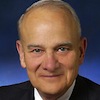 Chair, National Research Council’s Computer Science and Telecommunications Board
Chair, National Research Council’s Computer Science and Telecommunications Board
Wulf’s service includes founding Tartan Laboratories, heading the Computing Science Department of the University of Virginia, heading the Computer and Information Sciences and Engineering Directorate at the National Science Foundation.
Joseph F. Traub
 Edwin Howard Armstrong professor of computer science at Columbia University
Edwin Howard Armstrong professor of computer science at Columbia University
Under his leadership, CSTB became a major policy voice for the computing research community and has produced many important and influential reports and studies. His most recent report, Computing the Future: A Broader Agenda for Computer Science and Engineering, was released at the Snowbird Conference ‘92.
David Gries
 Taulbee Survey, CRA
Taulbee Survey, CRA
In 1985, Professor Gries was one of the key authors of the trends report, “Imbalance between growth and funding in academic computing science: two trends colliding,” a report that successfully predicted the upturn in computer science Ph.D. production and documented the special research funding problems a growing academic discipline was having in the face of limited research funding. This report marked a turning point in the computer science and engineering community’s understanding that it must give increased attention to national science policy issues.
Professor Gries is also known for his dedicated work since 1985 in making the Taulbee Survey a comprehensive and reliable annual survey of Ph.D. production, faculty salaries, and faculty hiring in Ph.D. granting departments in computer science and engineering. Under his management the Taulbee Survey had come to have essentially complete coverage of these departments in the US, making it both a valuable resource for dealing with the growth of computing research and an accurate historical record of that growth.
Finally, Professor Gries deserves special mention for the inauguration of the CRA news journal, Computing Research News. He served as chair of CRA’s editorial board from the inception of the news journal until mid 1990. More than any other board member of the Computing Research Association, Gries saw the need for such a journal and gave unstintingly of his time and his direction to the development of CRNews.
Dr. Robert Kahn
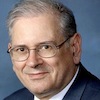 President and founder of the Corporation for National Research Initiatives (NRI)
President and founder of the Corporation for National Research Initiatives (NRI)
Dr. Kahn has served on the Technical Staff at AT&T Bell Laboratories, the faculty of M.I.T. and at Bolt Beranek and Newman, where he had a driving force in the development of the ARPANET. Joining the Defense Advanced Research Projects Agency (DARPA) in 1972, he became Director of its Information Processing Techniques Office (IPTO) where he started and managed numerous research programs, including the billion dollar Strategic Computing Program.
Dr. Kahn is President and founder of the Corporation for National Research Initiatives (NRI), which is a nonprofit research and development organization formed in 1986 to help focus U.S. strengths in information processing technology. Working with industry, NRI is engaged in scientific and engineering productivity.
Peter J. Denning
 George Mason University
George Mason University
Through his pen, in over 25 articles over the past five years, he has done much to make the accomplishments of computer science understandable and accessible to researchers in other disciplines, leading ot a better acceptance of computer science in the community. At the same time, his efforts over the years to define an intellectual core of computing have led to a better understanding from within and have produced a curriculum designed around basic principles and domains of competence in the core.
Throughout his career, Dr. Denning has exemplified the kind of service that has helped computing research grow to a healthy maturity.
Kent K. Curtis
National Science Foundation
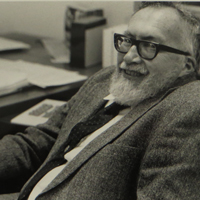 Rick Adrion wrote of him in Communications of the ACM (March 1, 1988):
Rick Adrion wrote of him in Communications of the ACM (March 1, 1988):
Kent K. Curtis was a pivotal champion of computer science as a field of academic research during a formative time in its history, drove the
development of the Computer Science Network (CSNET), which was later recognized as the critical bridge from the ARPANET to the modern internet, and headed the taskforce whose conclusions led to the NSF Advanced Scientific Computing Initiative and the NSFNET…. When the Directorate for Computer and Information Science and Engineering (CISE) was organized in 1985, Curtis became director of the Division of Computer and Computation Research. [In 1987] he was named chief scientist for CISE.


